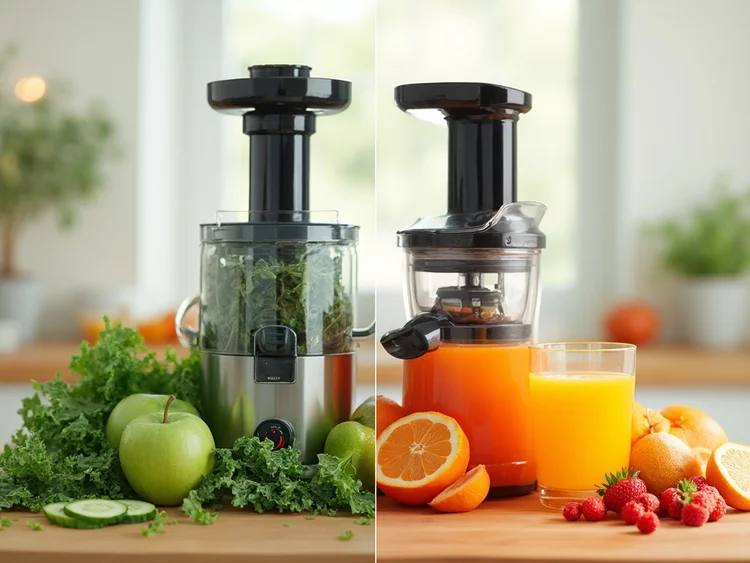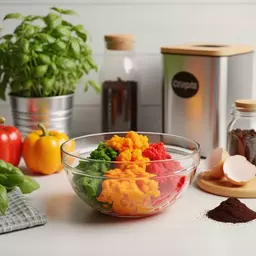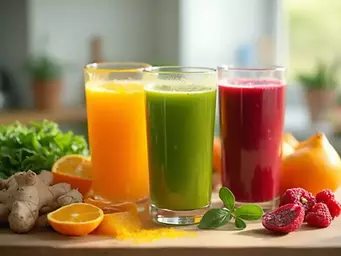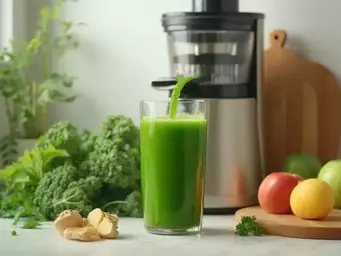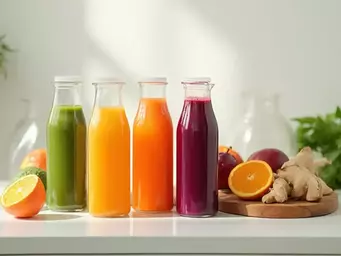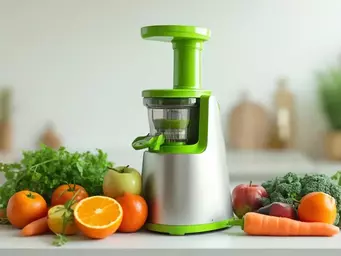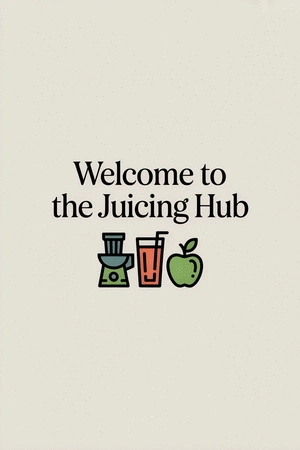Have you ever stood in your kitchen, staring at a pile of vibrant fruits and vegetables, wondering how to capture their essence in a glass? Juicing is not just a health trend; it’s a delightful way to infuse your daily routine with nature’s goodness.
What You Will Learn
- Cold press juicers preserve more nutrients and enzymes, making them ideal for health enthusiasts.
- Centrifugal juicers offer faster juicing times, catering to busy lifestyles.
- The flavor of cold-pressed juices is often richer due to the preservation of natural elements.
- Cold press juicers generally have a higher price point, while centrifugal models are more budget-friendly.
- Using ripe produce and alternating between hard and soft ingredients maximizes juice yield.
- Cold press juicers are better for leafy greens, whereas centrifugal juicers excel with hard fruits.
Juicer Type Comparison: Key Differences & Benefits
Delve into the distinctions between cold press and centrifugal juicers to find your perfect match.
Cold Press Juicer
Method: Slow crushing & squeezing
Heat Generated: Minimal
Nutrient Retention: High
Juice Quality: Richer taste, thicker consistency, less foam, less oxidation
Speed: Slower
Ideal For: Leafy greens & softer fruits
Price: Generally higher
Benefits: Preserves more vitamins/minerals, generates less oxidation, richer taste/texture.
Centrifugal Juicer
Method: Fast-spinning blade shreds, separates pulp
Heat Generated: Some
Nutrient Retention: Good, but lower than cold press
Juice Quality: More pulp, slightly oxidized
Speed: Fast
Ideal For: Hard fruits & vegetables
Price: Generally lower
Benefits: Faster juicing time, lower initial cost, ideal for hard produce.
Which One Is Better For You?
Understanding Cold Press and Centrifugal Juicers
Choosing the right juicer can feel like a daunting task with so many options out there! At The Juicing Hub, I’m here to make it easier for you. Let’s explore two popular types of juicers: cold press and centrifugal juicers, so you can find what fits your lifestyle best.
What is a Cold Press Juicer?
A cold press juicer, also known as a masticating juicer, operates by slowly crushing and squeezing fruits and vegetables to extract juice. This method uses minimal heat, which helps preserve nutrients and enzymes. The result? A nutrient-dense juice that’s packed with flavor and health benefits!
These juicers are ideal for leafy greens and softer fruits. When using a cold press juicer, you might notice a thicker consistency in your juice, which many find satisfying. Plus, it typically produces less foam, making it a great choice for those who prefer a smoother drink. Studies suggest that slow juicing methods can lead to higher antioxidant activity in the juice, further supporting the nutritional benefits of cold press juicers.
- Preserves more vitamins and minerals
- Generates less oxidation
- Produces a richer taste and texture
If you're looking to get the most out of your produce, a cold press juicer is a fantastic investment for your health and wellness journey!
How Does a Centrifugal Juicer Work?
Centrifugal juicers work quite differently. They use a fast-spinning blade to shred fruits and vegetables, and then they separate the juice from the pulp through a strainer. This method is quick and efficient, making it popular among those with busy lifestyles. However, it does generate some heat, which can lead to nutrient loss. The National Center for Complementary and Integrative Health provides further insights into juicing and its potential health implications.
The speed at which these juicers operate means you can whip up a juice in seconds! For busy mornings, that’s definitely a plus. Just keep in mind that the juice may contain more pulp and be slightly oxidized compared to cold-pressed juice.
- Faster juicing time
- Lower initial cost
- Ideal for hard fruits and vegetables
If convenience is your top priority, a centrifugal juicer might be the perfect solution for you!
Key Differences in Juicing Methods
When it comes to cold press versus centrifugal juicers, there are a few key differences to keep in mind. Each type offers unique advantages that can cater to your juicing habits and health goals. Here’s a quick comparison:
| Feature | Cold Press Juicer | Centrifugal Juicer |
|---|---|---|
| Juice Quality | High nutrient retention | Good but lower than cold press |
| Speed | Slower | Fast |
| Amount of Juice | More juice from leafy greens | More juice from hard fruits |
| Price | Generally higher | Generally lower |
Juicing Techniques: Maximizing Juice Extraction and Yield
To get the most out of your juicing experience, there are several techniques you can employ. Here are a few tips that I've found helpful in maximizing juice extraction and yield:
- Use ripe and fresh produce for optimal flavor and juice yield.
- Chop fruits and vegetables into smaller pieces to make juicing easier.
- Alternate between hard and soft ingredients to enhance juice extraction.
- Don’t forget to include leafy greens—they can boost the nutritional content! For more information on maximizing the nutritional value of your produce, Colorado State University Extension offers valuable resources.
These little tweaks can greatly enhance the effectiveness of both cold press and centrifugal juicers. So, whether you're blending up a vibrant green juice or a fruity delight, these methods will ensure that you get every last drop of goodness!
Pro Tip
To maximize the nutritional benefits of your juice, consider incorporating a variety of produce. Mixing different fruits and vegetables not only enhances the flavor but also provides a broader spectrum of vitamins and minerals. For example, adding a handful of spinach or kale to your fruit juices boosts their nutrient content significantly without overpowering the taste!
Frequently Asked Questions About Juicers
What is the main difference between a cold press juicer and a centrifugal juicer?
A cold press juicer slowly crushes and squeezes produce to extract juice with minimal heat, preserving more nutrients. A centrifugal juicer uses a fast-spinning blade to shred produce, separating juice from pulp quickly, but generating some heat which can lead to nutrient loss.
Which type of juicer is better for retaining nutrients?
Cold press juicers (masticating juicers) are generally better for retaining nutrients and enzymes because they operate at a lower speed and generate minimal heat, which helps prevent oxidation and nutrient degradation.
Which juicer is faster to use?
Centrifugal juicers are significantly faster due to their high-speed shredding mechanism, making them ideal for individuals with busy lifestyles who need quick juice preparation.
Are cold press juicers more expensive?
Yes, cold press juicers typically have a higher price point than centrifugal juicers due to their more complex mechanism designed for nutrient preservation and higher juice yield for certain produce.
What types of produce are best for each juicer?
Cold press juicers excel with leafy greens, wheatgrass, and softer fruits, yielding more juice and preserving delicate nutrients. Centrifugal juicers are better suited for harder fruits and vegetables like apples, carrots, and beets.
How can I maximize juice yield from my juicer?
To maximize juice yield, use ripe and fresh produce, chop ingredients into smaller pieces, and alternate between hard and soft fruits/vegetables during the juicing process. Including leafy greens can also boost nutrient content.
Summary of Nutritional and Value Insights
As we wrap up our exploration of juicing methods, it's essential to distill the key differences between cold press and centrifugal juicers. Understanding these distinctions can help you make informed decisions tailored to your health goals and lifestyle. Each method has its unique advantages, and the choice ultimately depends on what you value most in your juicing experience.
Here’s a quick summary to highlight their major points:
- Nutritional Value: Cold press juicers typically retain more nutrients and enzymes, making them a great choice for health enthusiasts.
- Speed: Centrifugal juicers are faster and more convenient for those with busy schedules.
- Flavor: Cold press juices often have a richer flavor due to the preservation of natural elements.
- Cost: Cold press juicers generally come with a higher price tag, while centrifugal models can be more budget-friendly.
Ultimately, your choice will depend on your personal preferences and how you plan to incorporate fresh juice into your daily routine!
Cold Press vs. Centrifugal: Which Is Better for You?
When it comes to selecting the right juicer, the question of “which is better” often arises. For those focused on maximizing health benefits, I would lean towards a cold press juicer. The ability to extract juice while preserving nutrients makes it a fantastic option for anyone looking to enhance their wellness journey.
However, if convenience and speed are your priorities, then a centrifugal juicer will serve you well. These juicers get the job done quickly, allowing for a seamless integration of juice into your busy lifestyle. Consider your juicing goals and how much time you can dedicate to this refreshing routine.
- If you’re aiming for maximum nutrient retention, go with cold press!
- For quick, on-the-go options, centrifugal juicers are your friend.
- Take into account your budget—both initial investment and ongoing costs.
- Think about how often you’ll use your juicer—daily, weekly, or just occasionally?
Final Thoughts and Recommendations
As a passionate health advocate, I understand the significance of making informed choices about the tools we use for our health. At The Juicing Hub, I strive to empower you with knowledge that inspires healthy living. Remember, whether you choose a cold press or a centrifugal juicer, incorporating fresh juice into your daily routine can be a wonderful step towards better health!
Before making your purchase, it's always a good idea to read reviews and perhaps even try out a few models if possible. Personal experience can often lead to the best decision. And, of course, don't forget to experiment with recipes that excite you—after all, juicing should be a fun and vibrant part of your life!
Recap of Key Points
Here is a quick recap of the important points discussed in the article:
- Cold Press Juicers: Preserve more nutrients and enzymes, ideal for leafy greens, and provide a richer taste.
- Centrifugal Juicers: Faster juicing time, suitable for hard fruits, and generally more affordable.
- Juicing Techniques: Use ripe produce, chop into smaller pieces, alternate between hard and soft ingredients, and include leafy greens for optimal yield.
- Nutritional Insights: Cold press juicers retain more nutrients, while centrifugal juicers offer speed and convenience.
- Choosing the Right Juicer: Consider your health goals, budget, and how often you'll use the juicer to make the best decision.
